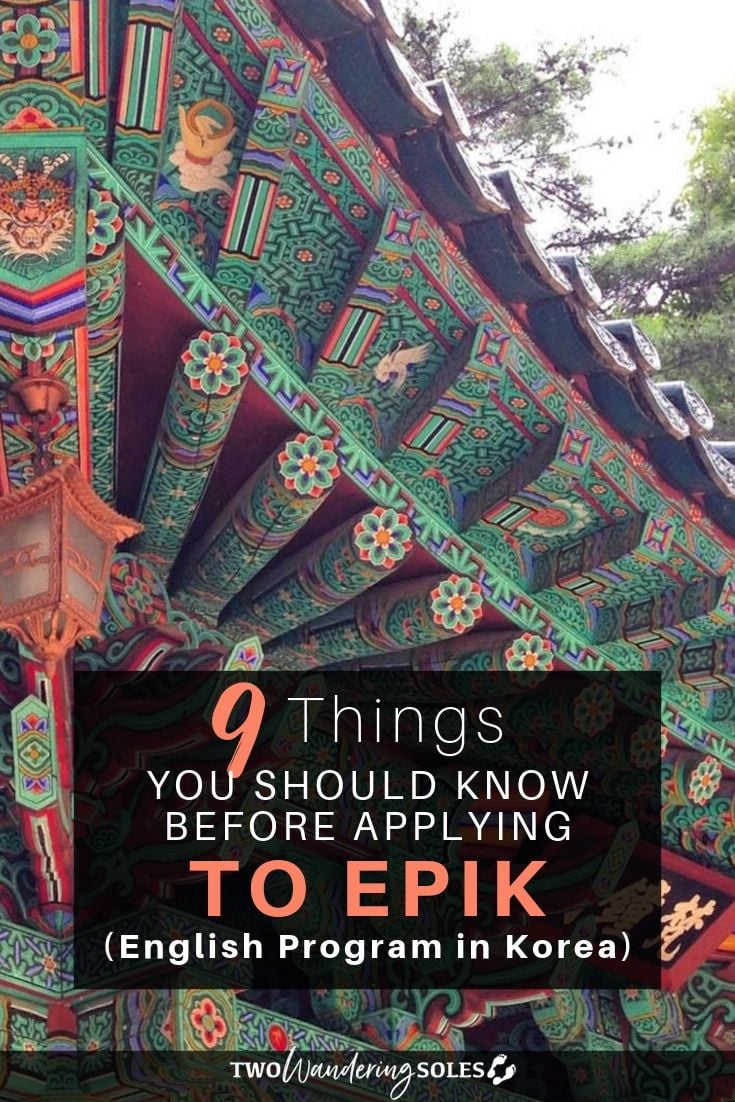
We constantly have people contacting us, asking for information about EPIK (English Program in Korea). In order to answer the most commonly asked questions, debunk some myths and share our very personal insights, we have put together a list of things we wish we would have known during the application process.
I will start by saying that this article might seem to have a negative tone. It is not our intention to discourage people from applying to EPIK or considering South Korea as a place to teach English. There are so many fabulous things about this country and perks to this job. Umm, we saved $22,000 each in just one year! That’s a huge perk!
If you want to see just how great it can be, watch our award-winning EPIK Life video that shares about life as a teacher in South Korea!
Coming to Korea to teach English was such a good decision for both Ben and myself. That being said, there were a lot of things we didn’t know coming into this.
It is my hope that this blog post can help people considering applying to EPIK weigh both the pros and cons, and make an informed decision. Hopefully after reading this, you will come to Korea much more prepared than we were.
So here it goes…
FREE E-BOOK ON WHAT IT’S REALLY LIKE TEACHING ENGLISH
If you’re considering teaching overseas, you MUST read this. Most bloggers and TEFL providers don’t like talk about these 13 things, because they’re not fun to hear.
But taking the leap to teach abroad is a big, life-altering decision, and we think it’s important to know exactly what you’re getting into. The good, the bad, the UGLY. All of it.
1. Everything Depends
I can’t tell you how many times I heard this dreaded phrase uttered during our week-long orientation.
To say it was frustrating is a drastic understatement.
I had given up my life at home and traveled across the world for this job, and they still couldn’t tell me what I should be able to expect? It seemed ridiculous to me that there were still so many unknowns.
Now I know why this phrase kept being repeated. It’s completely true. Your workload, your co-teacher, the number of schools you teach at, and even the distance you live from school can vary. A lot.
Everybody I know teaching English in Korea has completely different situations. Like black and white different. And all shades of gray in between.
I have a pretty good situation here. I teach at one school and live less than a ten minute walk away. My co-teachers are really forward-thinking and allow me to do a lot of what I want in the classroom.
Not everybody’s situation is so pleasant.
Most of my friends in my province teach at more than one school – I know two people who teach at four different schools each week. Additionally, co-teachers can be difficult to work with, or may not even show up to your class at all. You could also be making a rather long commute each day – sometimes more than an hour.
As much as I hate to say it, everything about your situation really just depends. And you won’t know your fate until you’ve signed your contract, packed your bags and have arrived in Korea.
2. Placement is RANDOM
My friends and I like to joke that EPIK put our names on darts and threw them at a map of Korea. I’m sure there is a bit more that goes into it than that, but from what I can tell, not much.
It seems that all of the qualifications and experience you scribble down on your application are not even given a glance.
Take my province for example. One of my friends and I both have experience teaching high school English. We were both placed in elementary schools, while two others in our province who have degrees in elementary education were placed teaching middle and high school. Doesn’t make much sense, does it?
Well, apparently there is some reasoning that goes into it.
One of them was told by another teacher at her school that they chose her because she is pretty.
I’ll be the first to break it to you: there are a lot of things that don’t make sense in the Korean education system. Though it certainly isn’t the only country with flaws in this area.
3. You have NO control over your location
For some reason when I was applying, I disregarded this point.
We sent in our application the very minute the system opened, with our preferred location clearly marked “Seoul”.
I have two years of teaching experience and Ben has a master’s degree. They will be fighting over us, I convinced myself.
Not the case.
Well, when we finally received an email containing the region in which we would be living for the next year, I saw that Gyeongbuk – a region I had never heard of, was in the line where “Seoul” was supposed to be. Now, four months later, there are many reasons I’m thankful we aren’t living in Seoul, but that doesn’t change my initial disappointment.
If you are very adamant on where you want to live in Korea, this might just be a deal-breaker.
Related: 8 Unique and Fun Things to do in Seoul
4. You really won’t know ANYTHING until you arrive in Korea
I tried to embrace all the unknowns as an adventure, but it’s more difficult than you’d think. Especially when curious family and friends ask all sorts of questions in the months leading up to your departure.
The questions they asked were the same ones I had myself, and when I answered with, “I don’t know,” they seemed to make me freak out more. “How are you moving across the entire world without knowing where you’ll be living or what age you’ll be teaching?!”
Yeah, at that point we were already committed. Jobs were quit. Flights were booked. Contracts were signed. We just had to trust that everything would work out. And it did.
I’m not sure why EPIK doesn’t just give more information a tad earlier than say, the very day you have to meet your principal for the first time, but that’s just the way it is.
5. Get familiar with “desk warming”
I’m writing this blog post from my school computer. And before that, I was catching up on the news, and before that, browsing Facebook.
It may not sound all that bad, but this is something that I’ve really struggled with getting used to. I value being challenged in my work, and when I’m not, my days drag by.
Again, it depends on your school situation, but I have a lot of free time on my hands. I’m at school eight hours each day, but teach for less than four. The rest of the time is spent lesson planning and doing my own thing.
So depending on how you look at it, you are either getting paid a lot to be able to do whatever you want, or it can be a point of frustration.
6. Applying as a couple makes things tough
It’s not impossible, but it sure does make things harder, and drags out the process quite a bit.
Let me start by saying that if you are applying with a friend or boyfriend/girlfriend, do not count on being placed in the same location.
There’s a pretty good chance you will not be anywhere close to each other. Two sets of people I met at orientation came all the way to Korea together, and found out on the last day of orientation that they would be living hours apart.
If you are married though, you’re guaranteed to be placed in the same city with shared housing. For some reason though, they insist that finding positions for married couples is difficult, and took longer than the typical applicant to place us.
I’m not quite sure why this is, because other than finding an apartment for us both to live in, our schools have not communicated at all. Not even about making sure our vacation dates coordinate. Which brings me to my next point…
7. Vacation dates are NOT flexible
This topic is one of the biggest frustrations we have encountered so far.
One of the major reasons I think anyone teaches in a foreign country is to be able to travel. I know that was a huge factor for us.
Vacation time in Korea works much differently than it does in the United States as well as many other countries. I’ll do my best to give you a basic overview of how the system works in public schools in Korea.
During your contract year, you will get 10 days off in the winter, and 8 days off in the summer – a good amount of time to be able to explore neighboring countries.
My school has roughly four weeks off for winter break, but I need to be there at my desk or leading English Camp for two of those weeks. No exceptions. The other two weeks are mine to do with as I wish. Same rules apply for the summer.
So even on days when there are no students, you still have to come into school and sit at your desk. Watch Netflix, take a nap, Skype friends at home, write blog articles – do what you may, but your butt better be warming that chair.
We are extremely lucky that our vacation time matches up. At first, it looked like we would have different dates, and our schools weren’t overly willing to coordinate them. We finally got our way, but it wasn’t easy.
Another frustrating part is that you can’t just take a day off here or there. It makes it difficult to have visitors (unless you want to stay in Korea during your school breaks, or unless your visitors don’t mind you being at school all day).
Both Ben’s and my parents were hoping to visit us in Korea, but considering we wouldn’t be able to take any days off, we told them not to come. We would feel awful having them make the (long and expensive) journey here if we aren’t able to spend time with them.
8. You can’t use your sick days
Although you are allotted a certain number of sick days in your contract, it is common knowledge that you just don’t take them. Unless you are laying in a hospital bed dying. Seriously, teachers will come to school hacking up a lung and still teach their regular classes.
And if you do decide to take a sick day, expect someone to stop by your apartment and check on you. I’ve heard stories of people staying home hung-over and having their principal make a visit.
9. EPIK is cutting back their numbers
A few years ago, the city we live in had a busload of EPIK teachers arriving each February and August. There was a South African-run bar in town, and from what I’ve heard, the expat scene was buzzing.
Ben and I were two of three new teachers for our intake last August. The South African bar is now closed, and the expat scene here in Gumi is on the decline.
This is a trend across the country as the government has cut back on funding for Native English Teachers.
This doesn’t necessarily mean you will have trouble finding a job. What it does mean though, is that you may be one of the only new teachers in your city. There will likely be other expats who’ve been living there for a while, or those who teach at private schools. But don’t expect a clan of other EPIK teachers living on your block, as you may have found five years ago.
Teaching English isn’t for everyone
No amount of money is worth being miserable. Honestly, we really enjoyed being teachers in Korea. But there are definitely some frustrations to the job (i.e. read #1 – 9!)
There are many hours you need to be at school without having classes – the beloved “desk warming” time! And sometimes we felt more like “game teachers” than actually being able to do the types of lessons we wanted. When living in a different country, you have to adapt to their culture and you can’t necessarily do everything the way you think it should be done.
If you are interested in working overseas and saving a ton of money, but teaching just isn’t your thing, don’t worry. There are plenty of ways you can earn money while still being able to experience a culture different from your own. For instance, here’s a breakdown of how to get a job in Australia. It’s quite easy if you know the right steps, and you can save a ton of money if you plan ahead!
I hope this article isn’t too much of a bummer, so I will let you in on some of the good surprises too:
-
We are making and saving more money than I expected we would – a huge perk! We were able to save $22,000 USD each in one year!
-
We’ve made a lot of really good friends.
-
My students are pretty awesome. They seriously make me smile every day.
-
There is so much to do and see in Korea, and we’ve been able to travel on many of our weekends. Check out our Korea Bucket List.
-
Once vacation dates are all sorted out, it is pretty nice to be able to take a 14-day trip in the winter to the Philippines and a 10-day trip in the summer to Bali. (Plus lots of little weekend trips, like our trip to Japan!)
-
Flights to other countries in Asia are really cheap, making Korea a great hub for exploring!
-
There quite a few Korean holidays throughout the year (a.k.a. no school).
Read more about our first months in Korea:
We’ve Got Some Big News – sharing our decision to teach overseas
Why Korea? – some of the reasons we chose to teach in Korea as opposed to other countries
Korean Surprise – EPIK orientation and our first couple weeks in Korea
Korean Struggle – some everyday tasks that have been a big struggle in Korea
Korean Apartment Tour – come on a tour of our Korean apartment
EPIK Life Video Contest Winner – watch a video we created about our life here in Korea
Are you interested in teaching English abroad
Teaching English in South Korea was one of the best decisions we’ve ever made. Be sure to check out our Teaching English Abroad homepage for resources on everything you need to know from how to get started to moving abroad. Or you can read some of our favorite articles about teaching English below.
-
TEFL Certification: The Complete Guide to Teaching English Abroad
-
How to Save $22,000 in One Year Teaching English in South Korea
If you’re planning a trip to South Korea, be sure to check out our Ultimate Guide to South Korea for answers to all of your most burning questions!
Save this article on Pinterest for later!






We want to hear from you!
What do you think about EPIK? Do still have any questions? Comment and we’ll do our best to get back to you!


WAYGOOK-COOK, Gumi.
I’ve been there many times. The "South African" bar was run by a white South African dude, and his Korean wife. I traveled back to that area after being absent many years, went to go stop in, and thought I had the wrong location, turns out it’s not there anymore.
Good memories, large ex-pat community, now, not just because of EPIK, it’s virtually gone.
Hey Ben and Katie! So you mentioned in point 3 that there are a few reasons why you’re happy that you ended up not being placed in Soeul. Could you name a few of them? I’m doing as much research as I can, but it’s alwasy best to hear from people wioth actually experience haha. Thanks for writing and running such and amazing blog!
What did you do about the language barrier? Di you learn Korean or did some Korean people speak English?
Hi, there, Ben and Katie. I enjoyed your article about things you wish you’d known about EPIK. I’m an experienced English teacher, but I have a couple of questions I’d like to ask.
Secondly, I have also taught in hagwons, and found that I was able to cope better than expected with the faster pace. I saved money from these jobs and still have cash in my Korean account. I can point to real successes in class. But I needed to transfer jobs, and ended up coming home to the U.K.
This week, I applied to several hagwon jobs and got replies like: "Oh, please send your most recent photo." (But I had sent it). And "do you have your apostilled criminal record check?" (YES, I have it, and it was mentioned in the title line of my first e-mail to that recruiter). What’s with these people? Some people now require a teaching video. Any tips? Also, would I now need to actually be physically in Korea to apply for hagwon jobs. Thank you for reading, and I look forward to reading your other articles.
Did they pay for your airline fare before you left the states or are you expected to fund yourself until you reach Korea?
Hello,
I was wondering with teaching experience already under my belt. What did you guys feel more comfortable with: working with EPIK or hagwons? I know everyone has different stories but which one would you guys recommend?